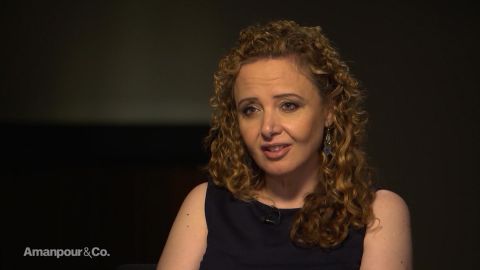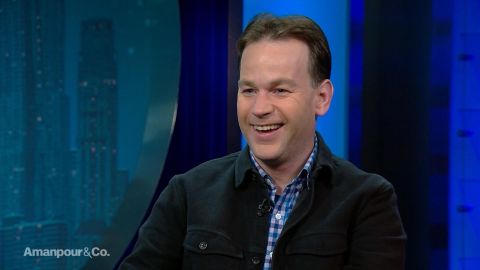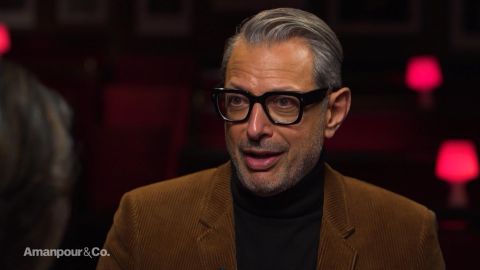Read Transcript EXPAND
CHRISTIANE AMANPOUR: The comedian Mike Birbiglia has helped redefine the boundaries of confessional comedy with his funny and brutally honest style, whether on stage, in print, or on the mega-hit radio show “This American Life”. You may recognize him from one of his many jobs onscreen, in “Orange Is the New Black”, Showtime’s “Billions”, or the movie “Trainwreck”. He’s now debuting on Broadway with “The New One” which is a one-man show. And as our Alicia Menendez discovered, the exact topic, well, it’s hard to pin down.
ALICIA MENENDEZ: Thank you so much for being here.
MIKE BIRBIGLIA, COMEDIAN: Thanks for having me.
MENENDEZ: One of your rare moments off.
BIRBIGLIA: Yes. It seems like I’m doing all shows right now.
MENENDEZ: I would call “The New One” a show about fatherhood. Do you feel like that’s a fair description?
BIRBIGLIA: I think yes and it is a show about fatherhood and change I think. I think, you know, one of the things that when I was developing these shows, I want to make sure that it wasn’t just about being a parent but rather it was about how all of us, regardless of our age, have things that were we’re hostile to doing or hostile to changing in our lives. And for me, it so happened I never want to have a kid and then I flipped.
MENENDEZ: Your wife was a big part of that flip. Let’s take a listen to a skit in the show.
BIRBIGLIA: OK.
(BEGIN VIDEO CLIP)
BIRBIGLIA: She said I was clear I didn’t want to have a baby at the time but that I might change. I said I was clear I would never change. She said, “If you don’t want to have a baby, maybe I’ll have one on my own and we can stay married.” And I said, oh, that will be a good look. Just you and me and this kid that’s across you and some grad student jogging his way through (INAUDIBLE). You can’t have a kid on the side like you keep him in the shed. I mean people do it. I’ve seen the [13:40:00] documentaries. It’s just not what I aspire to. And then people will be like, “You guys have kids?” They’re going to be like, “She does.”
(END VIDEO CLIP)
MENENDEZ: In this show, you tick through your various reasons for not wanting to have a child including your various physical maladies.
BIRBIGLIA: Oh, yes, yes, that’s a big part of it. I have a sleepwalking disorder where I jump through a window. If people haven’t seen my movie Sleepwalk With Me or read the book, I had cancer when I was 20. I was very lucky to take it out. It didn’t come back. And there’s just, yes, I’m diseased, diabetes. I just have a lot of stuff.
MENENDEZ: One of the things I felt as a relatively new mom watching the show was I wonder what will happen when one day your daughter either Oona, either reads or sees this show.
BIRBIGLIA: Is she going to have access?
MENENDEZ: Yes.
BIRBIGLIA: That’s why it’s sort of I always think of it as sort of a magic trick of sorts because the first half of the show is this argument for why one would never want — why one should never want to have a child. And the second half is I had a child and I was right but here is how it turns on itself. And if it doesn’t turn on itself, truly and authentically and in an emotional way, the magic trick doesn’t work because like you said, Oona’s going to see this show someday and it’s going to have to be convincing that I did change. And Jen always laughs, my wife always laughs because she’s like — people asked Jen about that a lot and she’s like if you saw the two of them together, you’d realize that Oona would never believe that I wrote this show.
MENENDEZ: Because there’s some really I would say dark but certainly a provocative moment in the show.
BIRBIGLIA: I would say dark and provocative, both of those I think are true.
MENENDEZ: You say, “I understand why dads leave”.
BIRBIGLIA: Yes, that’s a hard one out of context. I mean people really have to see this show to understand that because it’s an expression of a very low point for my character and in his journey of just — and, of course, I say I’ve (INAUDIBLE) because I’m not going to leave, I’m never going to leave. But there are these low points, I think, in parenting and I get all these e-mails from moms and dads saying, “Wow, like thanks for writing this thing. It made me understand my husband more. It made me understand my wife more.” I want to write a show where people — where someone says all the things that people won’t admit to saying when they’re parents because I think, you know, the sort of the old — we’re only as sick as our secrets. I think that with parenting, there’s a lot of secrets. There’s a lot of things you can’t say.
MENENDEZ: What has been the most surprising response to the show?
BIRBIGLIA: There’s this really brilliant seat designer who came to the show who was off Broadway and she said — she has read this one review that was so like personal and like sort of hurt by the show, sort of and in a certain way. And she said it’s because you’re — I think it’s because you’re being so vulnerable, she feels like she can be vulnerable in her response to it and that makes a lot of sense. But I — my feeling about the show is that the goal of it is precisely that, it’s opening up so that the audience can open up about their own lives.
MENENDEZ: And it’s not just that you’re sharing, it’s that you’re sharing personal failures. I mean Sleepwalk With Me looks at a failed relationship.
BIRBIGLIA: Yes, I’m a failure. Sometimes, very excessive. No, just kidding.
MENENDEZ: Most of us are spending our lives trying to cover up our failures.
BIRBIGLIA: Right.
MENENDEZ: And here you are on stage reliving them.
BIRBIGLIA: Well, my take on it is like, you know, we’re all naked all the time whether we realize it or not.
MENENDEZ: What does that mean?
BIRBIGLIA: Like in other words, if you think you’re keeping a secret, you’re not. And so owning your own is — can be a really cathartic experience. And then it’s really cathartic, particularly cathartic when people experience that in the audience. It’s by far, of any of my shows, it’s the most that the audience has ever literally thanked me. Like I get e-mails all the time which is as a performer just like the greatest thing I’ve could ever experience ever.
MENENDEZ: One of the running jokes of the show is how people with kids try to convince other people to have kids and then walk away from the show wondering now that you have a daughter and you love her so much, have you become one of those monsters?
BIRBIGLIA: Yes. You’re the first person who’s asked me that question. I’ve become one of those monsters. My best friend from childhood, (INAUDIBLE) and I was like you have to — yes, you have to do it now, you know.
MENENDEZ: And not in a misery loves company way?
BIRBIGLIA: No, it’s not misery loves company. It’s — I mean I say and I joke about it in the show but it’s the — people say to you it’s the most joy you’ll ever experience and it just is. And it’s not — there’s no way to describe it because it’s like the equivalent of describing like, you know, when you’re aperture just opens and you just go oh, I didn’t know it could be like that. And then it’s my brother — my brother Joe who contributed writing to the show in his own lines. his character says in the show, he says — you know, I go what’s it like to be a parent? He says, “It’s relentless.” I say what do you mean and he says, “You know you go to the gym and you push and you sweat and it sucks.” And I go, yes. He goes, “When you have a kid, you can’t even go to the gym.” And then he says, “But it isn’t — here is the thing you should know, it’s not going to be better or worse, it’s just going to be new.”
MENENDEZ: You begin to play with a riff about your couch. Why your couch? It’s so important to you. Let’s take a look.
(BEGIN VIDEO CLIP)
BIRBIGLIA: I think the reason a couch is so expensive is that it’s just a sophisticated piece of technology. It’s a bed that hugs you. It’s like you want to watch TV? You want to eat pizza? You sure do like eating. I like that about you. And beds are comfy but they know it. They’re like, “I like to be called a king. I’m going to need a box spring.” I’m like for what? They’re like, “I don’t touch the floor. Get your hands off that tag. I like this room.” Couches are humble. They’re like, “This is about you. Want to take a nap? Be my guest. You want to have sex on my arm? I’ll think about it.”
(END VIDEO CLIP)
MENENDEZ: So last night, the crowd was in stitches over this but the couch actually ends up being a really critical —
BIRBIGLIA: It’s critical.
MENENDEZ: — part of the show. What is the takeaway?
BIRBIGLIA: Well, I don’t want to tell people what their takeaway should be but the — I’ll tell you what the reason the couch entered into the show, was, you know, the show is a lot about becoming a parent. And I was doing some college shows about a year ago in the development of this show and I found that college students weren’t connecting to that version of the show. They didn’t have a couch. I was like I said oh, it occurred to me they don’t even know anyone with kids.
MENENDEZ: They’re closer to being a child.
BIRBIGLIA: They’re closer to being a child. They don’t even know — not only do they not have kids, most of them, they don’t plan to have kids most of them, and they don’t know anyone with kids most of them. And I was like, wow, that’s a quandary with this show. And so I started to think about like what — when I was their age, what was my relationship with being an adult. And I thought about my couch and how like when I was in college, you just get a couch on the street, you know, and it built from there. And then I swear to God, once I put the couch — and the couch, of course, was the metaphor of the show. Once I put the couch metaphor in the show, it kills the college kids. Like they totally get it. There — if you start with the metaphor that’s in their universe, they’ll go anywhere. It’s just getting them in.
MENENDEZ: It would have been very easy arguably to do to The New One as a stand-up routine.
BIRBIGLIA: Sure.
MENENDEZ: Why did it need to be a play?
BIRBIGLIA: Sleepwalk With Me was a play. I did 10 years —
MENENDEZ: You then transposed, right, into film?
BIRBIGLIA: Well, yes. I made it into a film and a book actually after that but that was my first solo probably play that Nathan Lane presented in 2008. Then I did My Girlfriend’s Boyfriend at the Barrow Street Theater 2011. And then Thank God for Jokes in 2016. And so this is my fourth one.
(BEGIN VIDEO CLIP)
BIRBIGLIA: You know women can be cops sort of part of the whole thing.
(END VIDEO CLIP)
BIRBIGLIA: What’s interesting to me when I work with my director Seth Barrish is we like to think of it as an experience. It’s like saying I love stand-up, certainly and I started out as a door person at a comedy club in Washington D.C. And I really admire stand-ups. What I’m interested in is that you can tell stories and ultimately have an arc and have staging and have lighting. It creates a full experience. I don’t know. It’s just what I love. You know what I mean? Like a certain point, you — I decided in my life that I was going to try to do things I love instead of doing things I like. And then —
MENENDEZ: When did you make that decision?
BIRBIGLIA: Three months ago. No. Like about 10 years ago. But 10 years ago, I was — I did like a sitcom pilot for CBS. And it was one of those like a dream come true for a comedian, they get their own sitcom. And it was — it felt actually sort of bad because it felt like there were so many chefs and there are so many people that by the end of the process — and it didn’t go to air. By the end of the process, it didn’t feel like me and I didn’t feel like what I do best.
MENENDEZ: You must have been relieved that it didn’t go to air.
BIRBIGLIA: Yes, I was so relieved. I think it’s like the greatest bullet I dodged in my career. And so after that, Jen and I moved back to New York and we just said let’s just take this show, the Sleepwalk With Me and let’s just put all the bells and whistles on it and produce it with the same vigor that they produce to network television.
MENENDEZ: One of the most memorable parts of Sleepwalk With Me, you give in your sleep challenges actually walk through a window.
BIRBIGLIA: Jump through a window, yes.
MENENDEZ: When did you realize that could be fun?
BIRBIGLIA: That’s a good question. I feel like I — as a comedian, I sort of knew right away this is nuts.
(BEGIN VIDEO CLIP)
BIRBIGLIA: Hello. I’m staying at the hotel. I had an incident where I jumped out my window and I’m bleeding and I need to go to the hospital.
(END VIDEO CLIP)
BIRBIGLIA: It did take me about 8 or 10 months to come to grips with talking about it on stage because there was some degree to which I thought, well, if I tell people this, they might just lock me up against my will. Like there just might — I might end up in a hospital. And it’s like really what’s so crazy looking back on this, I thought this might slow down like — I mean that’s, yes, that’s where the headspace I was in at that moment in time. Because, you know, in a lot of ways, Sleepwalk With Me is about this guy at the time who’s trying to achieve his dreams and he was, you know, in denial about this seriously walking disorder I had, behavior disorder. And I would think — you know, there’s a line on the show was I would think maybe I should see a doctor and then I thought maybe I’ll eat dinner. And I went with dinner for years and I never dealt with it until I jumped through a window. And then I finally went to a doctor and I was diagnosed. And yes, it’s — I mean what’s wild about the sleepwalking disorder is that there’s no cure for it.
MENENDEZ: Right.
BIRBIGLIA: And so it’s just something, you know, I sleep in a sleeping bag. And I, you know, I don’t do this anymore but I used to wear mittens so I couldn’t open the sleeping bag back. And then lately, because I have a daughter and I bring it up in the show, I created a fitted sleep sheet. It’s totally real. Fitted sleep sheet, there’s a hole for my head and the joke is in one for my wife as she never uses it. And then I secure the sheet under the mattress with a rope and a camping clasp. So I’m like a relatable Hannibal Lector but it’s all real, man. I mean — but I — what’s so funny is that’s an extreme, right, like that’s a really extreme thing to have a sleep sheet and to your holes in — your head in a hole. But what’s interesting is in this inspectoral (ph) we’re saying earlier, people relate to it. There’s a recognition laughter. And the reason is not because they sleep in a sheet that has holes in it but because everybody has their thing. Everybody has their thing they’re embarrassed about. They don’t want to talk about it. And then they see you talk about it, they go, “Oh, I guess I could talk about that.”
MENENDEZ: Mike, thanks so much.
BIRBIGLIA: Thank you.
About This Episode EXPAND
Christiane Amanpour speaks with Syrian-American doctor Rim Al-Bezem to discuss her highly unusual, personal foreign policy intervention and actor/musician Jeff Goldblum about his debut jazz album. Alicia Menendez speaks with comedian Mike Birbiglia about his new one-man Broadway show.
LEARN MORE


